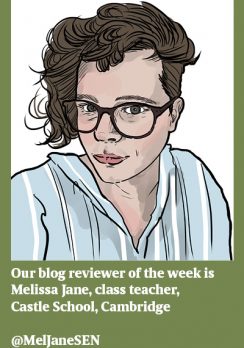This week’s top picks of the education topics are adapting to change, being black and disabled, mainstreaming accessibility and educating refugee children
Teaching outdoors and incomplete pictures
@edifiedlistener
A soothing read as we approach the end of term
We’re nearing the end of the most unusual term of my teaching career and here, Austria-based PE teacher Sherri Spelic addresses some of the emotional challenges of the past few months in an evocative and empathetic piece. She describes her process of adapting to one relatively small change, and how she was quick to blame herself when the change didn’t work straight away. “[We’ve] dramatically shifted our approaches to any number of routines and habits – and still, when things go south […] how many of us are quick to blame ourselves?” It’s a soothing read as we approach an end of term that will be as different as the rest of it has been.
When will disabled Black lives matter?
@zahrabei
For Black disabled people, discrimination multiplies
I think a lot about preparing young people to go out into the world as adults, hoping it will treat them with compassion and fairness. Unfortunately, this is often not the case for disabled people, who still face widespread discrimination. We also know that Black people and people of colour continue to face systemic racism, as highlighted this summer by Black Lives Matter protests around the world. For Black disabled people, the discrimination multiplies, barriers building upon one another. Zahra Bei’s blog post outlines the case of Osime Brown, a young autistic Black man who is under threat of deportation to Jamaica. As Bei explains, Osime was permanently excluded aged 17, and only then given access to diagnosis and support for his autism, which came too late to prevent his exposure to criminal exploitation. As Bei shows, Osime’s experience is not unique and “highlights the discrimination inherent in education, health, social care, criminal justice and immigration systems. Multiple injustices are deeply entrenched.”
@2tubies
Medical needs are an everyday reality for some young people
Health is on every teacher’s mind at the moment, but even before the pandemic medical needs were an everyday reality for some young people. Helen, who has two sons with medical conditions, writes about the huge variation in practice she has encountered during their education. The best schools offer “great communication and relationships with parents, principled leadership and an equal value placed on all pupils”. The worst left one of her sons “excluded from activities [and] not valued at all”.
Helen makes an observation shared by many disabled people since the start of this pandemic: the frustration at the sudden appearance of accessibility measures disabled people have requested for years. As Helen says, “It has been bittersweet to watch the pace of blended learning develop now that it is a requirement for all children.” As a former disabled student, I can only agree.
Exploring the journey to further and higher education for refugees and asylum seekers
@Refugee_Support
Schools play a key role in delivering these recommendations
In 2016, I volunteered in refugee camps in northern France. The people I met, who had fled all kinds of violence and trauma, had many reasons for taking such risks to reach British shores: family, cultural connections, employment prospects. A common reason was education: many told me they felt our education system would welcome them based on their potential, not their passport. This research blog suggests this isn’t yet the case.
While the research, drawing on testimony from 500 young refugees and asylum seekers, focuses on barriers faced when trying to access further and higher education, schools play a key role in delivering its recommendations and a key source of best practice in helping young refugees overcome barriers that are financial, legal and practical, such as navigating complex application systems. As one young person said, “My whole journey was about finding the information that wasn’t given to me.” Just giving refugees permission to enter the country is not enough ̶ we must also give them the knowledge they need to access and to thrive in the education institutions we pride ourselves on. What better places to lead the way on this than our knowledge-rich schools?













Your thoughts